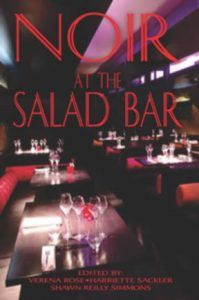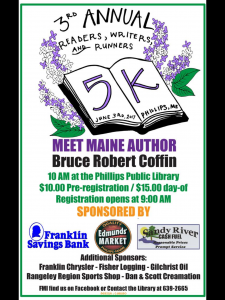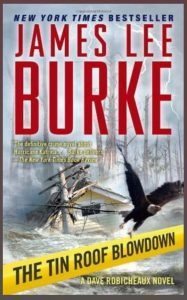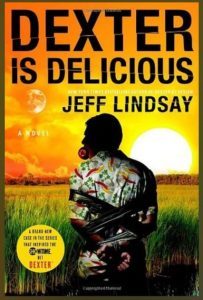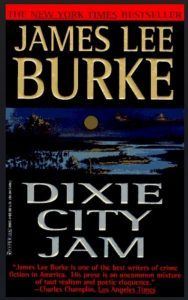Kathy Lynn Emerson's Blog, page 42
June 5, 2017
“Be Tender, Laugh More”
A prolific and well-loved Oregon writer, Brian Doyle, died last week. Though I shared the other Portland with him for thirteen years, I didn’t know him except through his essays and fiction. He edited the University of Portland’s alumni magazine which, in the words of the Oregonian, the Portland, OR newspaper, “punched well above its weight class” by publishing fine authors from all across the country. As with so many writers whose work I love but never met, his loss leaves a hole in my literary heart. Try Mink River if you love fiction, or How the Light Gets In for his incomparable essay voice.
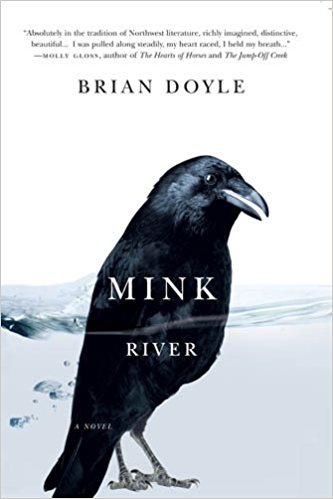
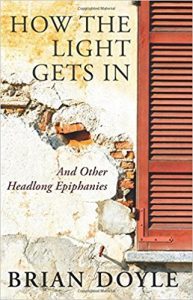
When he was diagnosed with the brain tumor that killed him and friend asked him what they could do, what he told them was pure Doyle: “Be tender. And laugh more.” What style and what class . . I can think of no better advice for the times we are in, or any other times, for that matter.
After attending the Maine Writers and Publishers Alliance Literary Awards last week, I was reminded that one of the things I love about writing in Maine is a sense of hidden community, a knowledge that no matter what you’re writing or from where, there are people who support you, maybe without you even knowing. You may not see them or hear from your people every day but you know they’re there. Who of us hasn’t had an unexpected word of encouragement from someone who knows exactly what your bad work day is like? Or gotten a sorely needed kick in the pants?
It reminds me that, though writers spend some major part of our time worrying about whether or how often we publish, receive prizes, win grants or fellowships, that nothing about writing and publishing, here or anywhere else, is a zero-sum game. By which I mean to say, your success does not diminish the chances of my success and vice-versa. Despite what our competitive culture would have us believe, there is not a finite pool of recognition, funding, publication, or love from readers that we all are fighting over.
Sometimes that’s a hard lesson to remember. My first book (and like a first child, most likely to be near and dear, at least until there are more) Solo Act was recently nominated for an award. 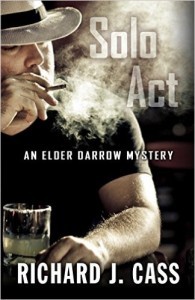 When I didn’t win, I confess to a momentary twinge of having lost something, until I realized I was mourning something I’d never held. In fact, once my head cleared, I recovered my original sense of elation at being nominated and was honored all over again to be in the company of writers whose work and work ethic I respect.
When I didn’t win, I confess to a momentary twinge of having lost something, until I realized I was mourning something I’d never held. In fact, once my head cleared, I recovered my original sense of elation at being nominated and was honored all over again to be in the company of writers whose work and work ethic I respect.
Beyond all the personal reasons why we write and publish is the fact that we are, as Toni Morrison says, a “necessary community,” working with language and writing to entertain, to inform, to argue, to open minds, to push back ferociously against all of the ignorance around us. 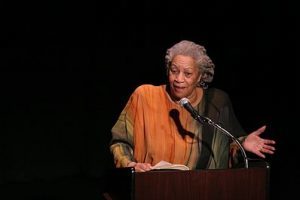 And so in that context, it really doesn’t matter what your ego tells you you need to feel successful. No number of big advances, best-seller list mentions, book sales, or reader love is stronger than the fact that what we do is a cultural necessity and a gift to the world.
And so in that context, it really doesn’t matter what your ego tells you you need to feel successful. No number of big advances, best-seller list mentions, book sales, or reader love is stronger than the fact that what we do is a cultural necessity and a gift to the world.
I wish I were selfless enough not to care at all whether I published or sold books or had millions of readers who loved my work but I try to temper my greed for all that with this fact—no matter what we write or publish, or even whether we publish, what we are doing is important and necessary work. Keep on. Be tender. And please—laugh more.
June 4, 2017
A Dispatch From the Land of Storytellers
By Brenda Buchanan
Though more than a month has passed since our April visit to Ireland, the experience continues to resonate. I often dream I’m there, dreams so vivid I’m surprised to open my eyes and find myself in Maine.

Slea Head Drive, part of the Wild Atlantic Way
In my waking hours I’ve been thinking a lot about storytelling, which is more than a pastime in Ireland, it’s a fundamental aspect of the culture. This makes perfect sense, when you think about it. In rural communities where education was limited, nurturing the oral tradition was a critical means to preserve history.
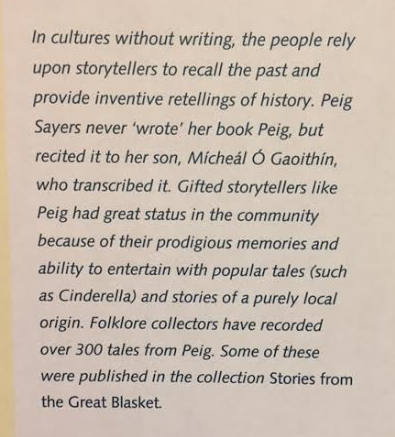
Part of an exhibit at the Great Blasket Centre in Dunquin, on the Dingle Peninsula, County Kerry
My grandparents’ and parents’ generations carried on the storytelling culture in America, where every conceivable event—from First Communions to wakes—were an opportunity for convivial extended family gatherings. As a child I remember wondering if the adults would ever stop talking. Now I wish I’d stayed at the table to listen.

This sign hangs in the Dingle pub owned by John Benny Moriarty, who rented us a snug apartment. Is túisce deoch na scéal, it says. A drink comes before a story. This is not to suggest the Irish people need to be lubricated to tell tales of their lives and those of their ancestors. They do so constantly, in song and in poetry, in writing and while sitting across the table.
My grandmother, who emigrated to the U.S. in 1905, seems to have been the source of my mother’s Ireland stories because most were about County Kerry. At age 24 Ellen Fenton traveled from Ventry to Cobh (then known as Queenstown) in County Cork, where her feet last touched Irish soil. She crossed the North Atlantic on the crowded SS Ivernia, a voyage of about ten days, to her new life in my hometown of Fitchburg, Massachusetts.
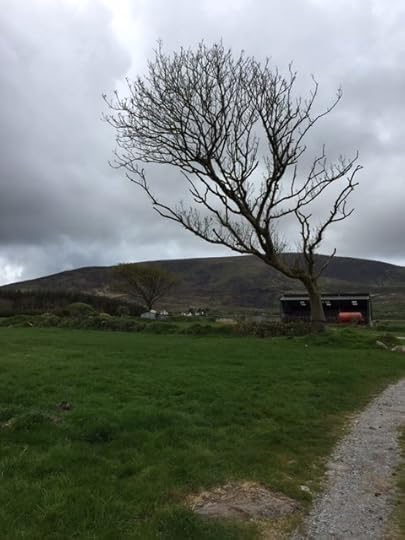
A farm field at Baile an Chotaigh, the townland where my grandmother was raised along with nine siblings.
I never knew my grandmother—she died when my mother was twelve—but many of her immediate and extended family members also emigrated to Fitchburg and to Springfield, some 80 miles to the southwest. Among my many second and third cousins, a good number were, as they say, off the boat. I grew up hearing their voices and their stories, but didn’t realize the immutable impact of that until I was in Ireland.
The brogues of the men, thick as honey, evoked something akin to déjà vu. I have no conscious recollection of my grandfather, who lived with my family in the last years of his life and died when I was not yet two years old. His accent would have differed somewhat from those in County Kerry given that he was from Mayo, but the cadence of male voices on the Dingle Peninsula was so familiar I realized my grandfather’s voice has been imprinted in my brain all these years, waiting for a trigger to bring the memory forth. It’s a fact about myself I never knew before.

The stained glass entry at the Great Blasket Centre tells its own story.
The Irish storytelling tradition is showcased at the stunning Great Blasket Centre in Dunquin, fifteen kilometers along stunning Slea Head Drive from my grandmother’s townland of Baile an Chotaigh. Like a number of other islands off the west coast of Ireland, Great Blasket is abandoned now except for tourists who ferry out for an afternoon hike around the ruined stone cottages. In 1953, the island’s residents were resettled on the mainland at the insistence of the government, which said it could no longer provide emergency supplies and transport.
Great Blasket yielded a number of remarkable writers and storytellers and because of their work, the island and its people will not be forgotten. One of the most famous is Peig Sayers, whose autobiography I inhaled one Sunday afternoon a month before we left for Ireland. Eight years my grandmother’s senior, the stories of Peig Sayers’ life are compulsory reading in Irish secondary schools. Remarkably—because she spoke Irish but never was taught to write in her native language—she dictated the book to her son. It describes in vivid language a rural culture where people had no money and few choices.
My people had little property, she says in the opening chapter. All the land they possessed was the grass of two cows.
The tale is bleak for the most part, a contrast to the stories of the Dingle Peninsula handed down through my mother. Perhaps my grandmother didn’t tell her children about the privation of her own childhood, wishing to spare them knowledge of the hardships she and her large family must have endured, scratching out a living on a small farm in a destitute place. Or maybe by the time my grandmother had children of her own the difficult memories had been replaced by a yearning to see her homeland again.

The view from the Ventry Strand, very near the farm where my grandmother was raised.
One thing I do know is there’s good reason so many of my family’s stories extol the beauty of the Dingle Peninsula. It is green, of course, and because of its intimate relationship with the sea, windblown and salt-saturated.
The squat, stone houses built centuries ago still stand amid modern houses as plentiful as mushrooms in a damp spring. The walls of the old places hold the stories of my ancestors, and this time I listened.
Brenda Buchanan is the author of the Joe Gale Mystery Series, featuring a diehard Maine newspaper reporter who covers the crime and courts beat. Three books—QUICK PIVOT, COVER STORY and TRUTH BEAT—are available through Carina Press or wherever ebooks are sold.
June 2, 2017
Weekend Update: June 3-4, 2017
 Next week at Maine Crime Writers, there will be posts by Brenda Buchanan (Monday), Dick Cass (Tuesday), Lea Wait (Wednesday), Barb Ross (Thursday), and Brendan Rielly (Friday).
Next week at Maine Crime Writers, there will be posts by Brenda Buchanan (Monday), Dick Cass (Tuesday), Lea Wait (Wednesday), Barb Ross (Thursday), and Brendan Rielly (Friday).
In the news department, here’s what’s happening with some of us who blog regularly at Maine Crime Writers:
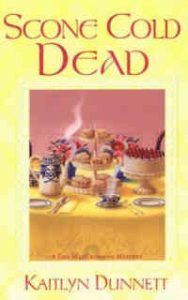 from Kaitlyn Dunnett/Kathy Lynn Emerson: I have a couple of Goodreads giveaways going on, one under each name. For a chance at a brand new, autographed, hardcover copy of Scone Cold Dead, the second book in the Liss MacCrimmon series set in Moosetookalook, Maine, use this link: https://www.goodreads.com/giveaway/show/238377-scone-cold-dead and for a chance at a brand new, autographed, hardcover copy of Julia’s Mending, a novel set in 1887 in rural New York State and written for children ages eight to twelve, click here: https://www.goodreads.com/giveaway/show/238693-julia-s-mending
from Kaitlyn Dunnett/Kathy Lynn Emerson: I have a couple of Goodreads giveaways going on, one under each name. For a chance at a brand new, autographed, hardcover copy of Scone Cold Dead, the second book in the Liss MacCrimmon series set in Moosetookalook, Maine, use this link: https://www.goodreads.com/giveaway/show/238377-scone-cold-dead and for a chance at a brand new, autographed, hardcover copy of Julia’s Mending, a novel set in 1887 in rural New York State and written for children ages eight to twelve, click here: https://www.goodreads.com/giveaway/show/238693-julia-s-mending
Two of the Maine Crime Writers have stories in a new anthology, Noir at the Salad Bar, to be published July 18 and featuring short stories with a food connection. John R. Clark‘s story is titled “With Great Relish” and Barbara Ross has penned “Jane Darrowfield: Professional Busybody.”
Going to be near Southport, Maine (that’s a neighbor of Boothbay Harbor) Thursday, June 8? Lea Wait and her husband, artist Bob Thomas, whose work is on display at the library through June, will be speaking together at 7 p.m. about what it’s like to be an artist and

One of Bob’s Paintings
author married to each other. Lea’s books (and, of course, Bob’s paintings,) will be available for sale, and Bob is donating one-third of the price of his paintings to the Southport Memorial Library. More info? 207-633-2741.
Bruce Robert Coffin: will be appearing at the Phillips Public Library, Saturday, June 3rd as part of the 3rd annual Readers, Writers, and Runners 5K event.
An invitation to readers of this blog: Do you have news relating to Maine, Crime, or Writing? We’d love to hear from you. Just comment below to share.
And a reminder: If your library, school, or organization is looking for a speaker, we are often available to talk about the writing process, research, where we get our ideas, and other mysteries of the business. Contact Kate Flora
Library Card
Bruce Robert Coffin here, manning the helm of the Maine Crime Writer’s Blog, albeit a bit behind my time.
Several weeks ago, before taking a much needed tropical vacation to Florida, I stopped by my town library and obtained a card. You’re probably thinking, what’s the big deal? Everyone has a library card, right? Well, I don’t know if everyone does or not, but this is the first card I’ve had since I was a youngster living in the Southern Maine town of Scarborough (Yes, John Rogers Clark IV, I am ashamed). My old card was from the historic Black Point Library. I got the idea after being told by several librarians, that my novel, Among the Shadows, is always checked out, and has a list of folks waiting to read it.
You might think that I don’t need any more books to read. After all, my to be read pile is already huge and, like most writers, ever-expanding. But like most writers, my love of reading equals my love of writing. Can’t have one without the other, right? It occurred to me that I might make more efficient use of my travel time by listening to audiobooks. Driving to appearances and conferences is time consuming. And since I would rather conserve the bulk of my time for writing, driving is the perfect time to digest books that I’ve been wanting to get me hands on. Assuming that you’re not already on the Cloud Library, you might be surprised how many books are available in this format.
As my intake of new books increases so has my list of favorite authors. As of late I have been enjoying the wonderful sardonic wit of Jeff Lindsay’s Dexter Morgan and the descriptive and insightful prose of James Lee Burke’s private sleuth from the Big Easy, Dave Robicheaux, as read by Will Patton. For the record, if HarperCollins ever gets around to producing my novels in audio, I hope to land a reader half as entertaining as the great Will Patton.
Well, I could go on and on about my new found love of audiobooks all day if you’d let me, but I’m afraid my writing must come first. Hey, I have deadlines to meet! And there are a few chores that need doing. Chores which will require me to hop in the truck and drive… I wonder what Dexter’s dark passenger is up to now?
Write on!
May 31, 2017
Voyage of Discovery: Writing a Rough Draft
 Kaitlyn Dunnett/Kathy Lynn Emerson here, pondering the similarities between writing a rough draft and making a voyage of discovery. You know, like Columbus searching for a shortcut to the Indies, or Cabot looking for a northwest passage to the wealth of Cathay. You may find uncharted lands and fabulous riches or you could be eaten by a sea monster or fall of the end of the earth. To paraphrase Mary Chapin Carpenter, you might end up as the windshield . . . or as the bug. There’s no way to tell till you try.
Kaitlyn Dunnett/Kathy Lynn Emerson here, pondering the similarities between writing a rough draft and making a voyage of discovery. You know, like Columbus searching for a shortcut to the Indies, or Cabot looking for a northwest passage to the wealth of Cathay. You may find uncharted lands and fabulous riches or you could be eaten by a sea monster or fall of the end of the earth. To paraphrase Mary Chapin Carpenter, you might end up as the windshield . . . or as the bug. There’s no way to tell till you try.
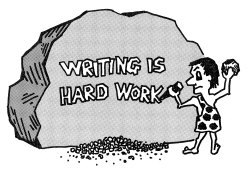 Whether you refer to this stage of writing as the rough draft, the first draft, or the [expletive deleted] draft, it’s a necessary step in producing a book. Those who plot in advance have some idea where they’re going with it. Those of us who write by the seat of our pants? Not so much.
Whether you refer to this stage of writing as the rough draft, the first draft, or the [expletive deleted] draft, it’s a necessary step in producing a book. Those who plot in advance have some idea where they’re going with it. Those of us who write by the seat of our pants? Not so much.
For me there is always a lot of going back and forth as new thoughts occur to me. Right now I’m about a third of the way into the rough draft of Overkilt, the twelfth book in the Liss MacCrimmon series. It’s due on my editor’s desk on the first of December. I got almost this far before I took a break to attend Malice Domestic at the end of last month and to give a final polish to the first Mikki Lincoln mystery, Crime and Punctuation, which was due today. So, last week, when I went back to what I’d written on this one, I was hoping my subconscious would have come up with some good ideas for the next two-thirds.
 I’d already had one epiphany concerning the identity of the murderer—this was a very good thing, since until then I had no idea who dunit. Unfortunately, after reading through what I’d already written and punching it up as I went along, I got back to the place where I’d stopped and sat there staring at a blank screen. What should happen next eluded me.
I’d already had one epiphany concerning the identity of the murderer—this was a very good thing, since until then I had no idea who dunit. Unfortunately, after reading through what I’d already written and punching it up as I went along, I got back to the place where I’d stopped and sat there staring at a blank screen. What should happen next eluded me.
As is so often the case, talking over an impasse with my husband helped jump start my brain. The first thing I realized was that one of the scenes I’d already written was in the wrong place. Once I moved it, the direction in which the plot should move became much more clear.
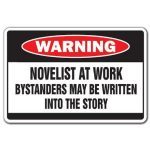 That sort of thing happens to me a lot when I’m working on a rough draft. I start at the wrong place or try to have something happen too early and until I spot where I went wrong, I’m stuck. Fortunately, although it may take me a while to see what’s right in front of me, I eventually spot the problem and figure out how to fix it.
That sort of thing happens to me a lot when I’m working on a rough draft. I start at the wrong place or try to have something happen too early and until I spot where I went wrong, I’m stuck. Fortunately, although it may take me a while to see what’s right in front of me, I eventually spot the problem and figure out how to fix it.
I scribble notes to myself that deal with events two or three chapters ahead. That’s about as far as I can see, which explains why I don’t outline the entire book before I start. I simply can’t visualize what happens next until I’m almost at that point in the writing. Is this an efficient way of writing? Of course not. But it works for me. And it got Columbus out on that ocean.
 Unless you are one of those rare writers who does all the pre-writing in your head before you ever put fingers to keys, the first version of a book will undergo many revisions before it sees print. Those people are rare. I’ve heard Isaac Asimov was able to do that and I’ve witnessed Mary Higgins Clark come up with near perfect prose off the top of her head, but the rest of us are stuck with multiple rewrites. The thing is, you can’t rewrite what isn’t there, which is why a rough draft, no matter how badly it turns out, is better than no draft at all. In my case, once I have something written down, I can fix it. And if that ship has sailed to a place I didn’t expect? That’s good, too. I end up with a whole new continent to explore.
Unless you are one of those rare writers who does all the pre-writing in your head before you ever put fingers to keys, the first version of a book will undergo many revisions before it sees print. Those people are rare. I’ve heard Isaac Asimov was able to do that and I’ve witnessed Mary Higgins Clark come up with near perfect prose off the top of her head, but the rest of us are stuck with multiple rewrites. The thing is, you can’t rewrite what isn’t there, which is why a rough draft, no matter how badly it turns out, is better than no draft at all. In my case, once I have something written down, I can fix it. And if that ship has sailed to a place I didn’t expect? That’s good, too. I end up with a whole new continent to explore.
Kathy Lynn Emerson/Kaitlyn Dunnett is the author of over fifty books written under several names. She won the Agatha Award for best mystery nonfiction of 2008 for How to Write Killer Historical Mysteries and was an Agatha Award finalist in 2015 in the best mystery short story category for “The Blessing Witch.” Currently she writes the contemporary Liss MacCrimmon Mysteries (Kilt at the Highland Games) as Kaitlyn and the historical Mistress Jaffrey Mysteries (Murder in a Cornish Alehouse) as Kathy. The latter series is a spin-off from her earlier “Face Down” series and is set in Elizabethan England. New in 2017 is a collection of Kathy’s short stories, Different Times, Different Crimes. Her websites are www.KaitlynDunnett.com and www.KathyLynnEmerson.com
The Heritage of a Garden Writer
John Clark on the start of planting season. Kate and I share an interesting heritage. Dad had a degree in horticulture from the Stockbridge School at U. Mass. Mom began writing about food and gardens when we were little. She went on to become a pretty slick gardener and was a member of the Garden Writers of America. We grew up on a chicken farm, but there were numerous gardens, a blueberry field, an apple orchard and a rhubarb patch.

Even after the most aggressive pruning yet, the apple trees are loaded with blossoms.
I disliked gardening as a kid, mostly because it usually involved me pulling weeds. I do remember the fun of standing on the seat of Dad’s Farmall Cub tractor so I could reach the higher branches on our two sour cherry trees.
After Beth and I got married and bought our own house in Chelsea, I tackled the wasteland that passed for a back yard and created a garden. It was a slow process, given all the rocks, ledge, broken glass and rusty metal out there, but over time it became a pretty decent spot. We added grape vines, apple trees, a plum tree, rhubarb, butternut trees and a cherry tree.
In 2003, we moved to Hartland and one of the conditions for buying the house was that I could bring my tiller and start a garden before the closing . The woman who sold the house to us had a flower garden, but was fine with our turning it into a vegetable garden. We moved the perennials to another flower garden or gave them away and ended up with a fairly good first garden.
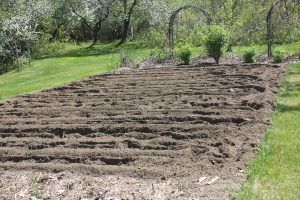
Our lower garden ready for planting with Honeyberry bushes and grape vines in the background.
Each year since then we’ve improved the soil, expanded the size a bit and added trees and vines to the back yard. Our one acre is extremely productive. Mature apple trees line the boundaries and we’ve come to recognize which bear the best apples. Three stand out, an early Macintosh, an unknown early yellow and a small dark purple that ripens later than any of the others. In addition, we have two Stanley plum trees that started bearing heavily last year, several grape vines that got special attention last summer and are pruned and bound in preparation for this year, two pear trees and three pie cherries. We also have some unusual fruiting critters. There are two Shadbushes, close to a hundred gold and red everbearing raspberries and a couple hardy kiwis that haven’t decided whether they plan to survive. The most intriguing plants are five Honeyberry bushes that all have fruit on them. They’re an edible variety of the Honeysuckle family, hardy to 55 below and fruit before strawberries. We’re eager to see how they taste. We’ve already enjoyed asparagus and rhubarb.
Two years ago, I took over tilling and weeding of my neighbor Larry’s garden when he became unable to work it. I shared it with Nate and Darcy, a young couple living beside Larry. They’re expecting their first child in July, so they ceded the garden over to me for this growing season. In essence, this doubled our garden space. That garden has potatoes, dry beans, onions, peas, pumpkins, old parsnip seeds and an attempt to start red cabbage outside of my greenhouse. I left room for spillover crops and it looks like cauliflower and cukes will fill that space.
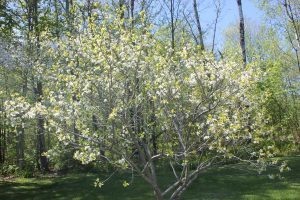
Plum tree with more blossoms than leaves.
In our garden, you’ll find 5 small raised beds filled with new sifted compost (Beth worked hard to get our monster compost pile mounded up with plenty of compost enhancer on it so I could run the tiller around the pile before sifting the good stuff) More onions, radishes, carrots, turnips and two kinds of beets will grow in them.
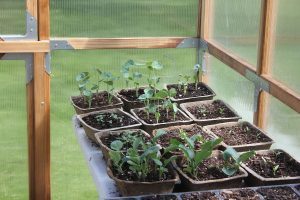
Some of the reasons I love my greenhouse.
Green beans, soy beans, more parsnips, corn, lettuce, tomatoes, Brussel sprouts, peppers, green cabbage, broccoli, cauliflower, yellow squash, zucchini and two varieties of winter squash round out the planting in this garden. If all goes right, we’ll be enjoying the bounty from mid July through October before starting on stored and frozen stuff to get us through the winter.

There are plenty of flowers, too. Can you believe these were scrawny transplants at this time last year?
No two gardening years are the same. This one has been rather damp and chilly so far. Remembering what each year has brought in terms of successes and disappointments always leaves me in awe of those hardy souls who had no choice a couple hundred years ago. A bad year meant life got real serious, real fast.
Stay tuned for a fall followup and feel free to share your garden plans and adventures.
May 30, 2017
There’s no research like being there
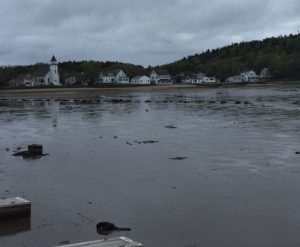
The tail end of Phippsburg at low tide on a gloomy Friday afternoon. Heaven!
Late Friday afternoon I was piddling around, trying to get some writing and other stuff done, when a realization struck me: It was a gloomy, cold and rainy Friday of Memorial Day weekend. Yeah, I know, when isn’t it? But it was a huge coincidence, because there’s a scene in the book I’m working on that also takes place on a gloomy, cold and rainy late afternoon Friday of Memorial Day weekend.
The scene was one I’d written for a previous book and it didn’t fit, so I’d taken it out sometime during the writing process, and like all scenes like that, saved in a computer folder labeled “outtakes” for future use.
It had been written for the second in my Bernie O’Dea mystery series, NO NEWS IS BAD NEWS, back when the plot was something totally different than what it ended up being. While I’d repurposed it quite a bit to fit the circumstances of the third in the series, which I’m working on — and it’s actually perfect for it — it was still a little flat and I couldn’t get it just right.

Sand Beach, Acadia National Park, summer 2010.
One of the issues was the setting. My books take place in Franklin County, so nowhere near the coast. But this scene was a weekend trip to the coast. One of those little getaways (spoiler alert!) that starts with high hopes, but crashes and burns. When I originally wrote it, it was at Acadia National Park and the important part took place on Sand Beach there.
When I took it out to repurpose it, that setting no longer worked and I’d been trying since last fall to settle on one that did. One that was less populated, less likely to have many people there on Memorial Day. That was a little harder to get to. Lots of things.
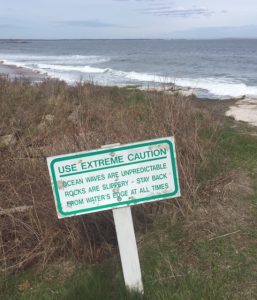
Reid State Park, April 29.
That effort took me to Reid State Park a few weeks ago, on a sunny Saturday. Loved the caution signs. They worked perfectly with the story. There were some really nice rocky parts. Still… Maybe it was the weather, but while I thought to myself “yeah, this’ll work,” I still didn’t feel right about it.
So there I was Friday, piddling around at my coworking desk in Yarmouth, when it struck me that the weather was exactly what it is in that scene. So was the day of the year.
Earlier in the week, my mom and I had had a discussion about why we used to go to Reid for our beach outings rather than Popham Beach State Park, where most of our Augusta neighbors and friends went back in the 1970s. Since then, Popham had been in my mind. Not for this scene, specifically, but just there.
Then, earlier that day, I’d read a press release about Phippsburg, which is where Popham is. The first white settlement in Maine landed there in 1607, spent one yucky winter, then hightailed it back to England. The news release had to do with a presentation on that somewhere. Not germane.

The Kennebec River in Hallowell, last week. I just can’t get enough of it.
But I’d always loved that peninsula. It’s where the Kennebec River meets the ocean, and I’ve always had Kennebec River love. Fascination and obsession. There’s something about that river, and I just can’t stop taking photos of it. What did we ever do before some smart guy stuck a camera in our telephone?
As a kid the fact that the same river that ran through our town burst into the Atlantic in this wondrous place always fascinated me. Could I drop something off Memorial Bridge in Augusta and go down to Phippsburg and grab it out of the water before it went out to sea? I’d wondered that as a kid.

Augusta on the Kennebec. As a kid I used to wonder if I tossed something off Memorial Bridge (there was no fence then!) could I find it in Phippsburg before it went into the sea? Photo taken October 2010.
In any case, Friday, as I sat at my coworking desk not really motivated to do whatever it was I was supposed to be doing, I decided to take a ride to Phippsburg and Popham.
Writers are often asked about our research and how we do it. It’s not just one thing, and one big research tool for me is getting in the car and going to the area I’m writing about. There is nothing that compares to being in the place. Not only what you see, but what you hear and smell. You can’t get that from a guide book or a Wikipedia posting.
I don’t want to spoil what’s going to happen in my book, but my trip to Popham (I never actually got to the beach, because I got caught up in the fort), was enlightening. I’d forgotten just how windy, long and overgrown the ride down the peninsula was. How many little sideroads go off of it.

The tail end of Phippsburg, where the Kennebec meets the sea.
Totally had forgotten about the fort and how cool it is. Built in 1861, it’s almost medeival in its dankness, even on a nice day. I remembered that part, because, joyously, it wasn’t a nice day. So maybe the fort will make it into the scene.
See? It’s okay to get distracted while on a research fishing road trip, as I like to call them. You never know what is going to embed itself in your brain and come out in your book. 
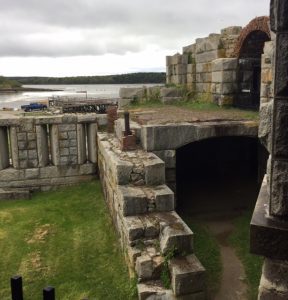
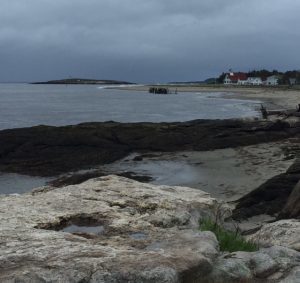 I’ll be going back to get some more beach background, but just being at the end of that peninsula at the exact same time of year my characters were there, in the exact same weather, brought that scene to life in my mind and gave it the oomph I’d been looking for for months.
I’ll be going back to get some more beach background, but just being at the end of that peninsula at the exact same time of year my characters were there, in the exact same weather, brought that scene to life in my mind and gave it the oomph I’d been looking for for months.
Maureen Milliken is the author of the Bernie O’Dea mystery series. Follow her on Twitter at@mmilliken47 and like her Facebook page at Maureen Milliken mysteries. Sign up for email updates at maureenmilliken.com. She hosts the podcast Crime&Stuff with her sister Rebecca Milliken.
May 28, 2017
Visiting Maine, and a Parade
By Barb, who is spending her Memorial Day helping her kids pack to move
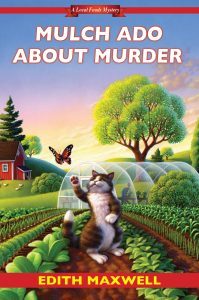 Happy Memorial Day, everyone! I hope you are all reading and relaxing. Today as my guest, I’m happy to have my friend Edith Maxwell, who tells us about the Maine connections in her latest Local Foods Mystery.
Happy Memorial Day, everyone! I hope you are all reading and relaxing. Today as my guest, I’m happy to have my friend Edith Maxwell, who tells us about the Maine connections in her latest Local Foods Mystery.
I’m delighted to be a guest here again today. Thanks for inviting me north, Barb. Mulch Ado About Murder, my fifth Local Foods Mystery, comes out tomorrow. And I’ll give away my last ARC of the book to one commenter here today.
Here’s the cover text:
“It’s been a hot, dry spring in Westbury, Massachusetts. As organic farmer Cam Flaherty waits for much-needed rain, storm clouds of mystery begin to gather. Once again, it’s time to put away her sun hat and put on her sleuthing cap when a fellow farmer is found dead in a vat of hydroponic slurry—clutching a set of rosary beads. Showers may be scarce this spring, but there’s no shortage of suspects, including the dead woman’s embittered ex-husband, the Other Man whose affair ruined their marriage, and Cam’s own visiting mother. Lucky for Cam, her nerdy academic father turns out to have a knack for sleuthing. Will he and Cam be able to clear Mom’s name before the killer strikes again?”
This is the fifth book in the series and it has at least one connection to Maine and another to today, Memorial Day. Originally I wanted to have my organic farmer head up to the Common Ground Fair for a book. The fair isn’t until September, though, and that would be too long in book time since book four, Murder Most Fowl, which took place in March. Maybe we’ll have a Maine setting for book six!
Throughout the series, Cam has been referring to her peripatetic academic parents, to whom she isn’t particularly close, but we’ve never met them – until this book. Right away Cam’s mother Deb gets involved in a public protest against a new hydroponic farmer, and she was seen going into the farmer’s greenhouse. So when Nicole turns up dead, you know the police want to talk to Deb.
The end of May is a super busy time on a small organic farm in New England. A few days after the murder Deb and Cam’s father William decide to get out of her hair for the day and head to Maine. Here’s a snippet from the next morning:
“Oh, yes,” William said, looking relieved at the change in topic. “We popped into a couple of Maine beaches on our way north. Old Orchard was very charming, wasn’t it, dear?” He patted Deb’s hand.
“Very.” Deb ate her last bite of om elet and sat back in her chair.
“And then we spent quite some time in Portland,” William went on. “Lunch at a brewpub, the afternoon in the Portland Museum of Art. And dinner and a stroll in Portsmouth on our way back. Very much a New England experience.”
You can squeeze a lot of two states into a day when you start at the New Hampshire border!
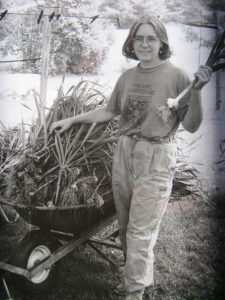 Of course, today is Memorial Day. This series is set in a town modeled on West Newbury, in the northeast corner of Massachusetts, where I had my own small certified organic farm a couple of decades ago. One of the annual spectacles is the Memorial Day parade, with all the quirks and color only a small town can present. I knew I wanted to include it in a book. Cam, her parents, her great-uncle Albert, and his girlfriend, Marilyn (who is modeled directly on my mother, also named Marilyn) all head to Main Street with folding chairs and good cheer.
Of course, today is Memorial Day. This series is set in a town modeled on West Newbury, in the northeast corner of Massachusetts, where I had my own small certified organic farm a couple of decades ago. One of the annual spectacles is the Memorial Day parade, with all the quirks and color only a small town can present. I knew I wanted to include it in a book. Cam, her parents, her great-uncle Albert, and his girlfriend, Marilyn (who is modeled directly on my mother, also named Marilyn) all head to Main Street with folding chairs and good cheer.
I had fun giving parade cameos to the core members of a long-standing Flick Chicks group I’m part of. We all started out as West Newbury moms more than twenty years ago. When you read the parade scene, look for the woman on the horse, one in the volleyball group, a Civil War reenactor, and a Girl Scout leader, and you see Deb Hamilton, Kim Wegryzyn, Judy Smith, and Janice Valverde, respectively.
Naturally (hey, it’s a murder mystery), at the end of the parade Deb gets involved with two of the people of interest in the murder – and another body drops.
I love writing this series and immersing myself back in the farming life without having to do all the hard work. Lots of readers have written me saying how much they learned about small-scale farming. I hope you like it, too.
Oh, and please join me in a fifth book birthday celebration for all five books on Facebook on June 1 from 6:30-9:30 pm! There will be prizes, and Barb will be one of the cozy authors visiting. More details here.
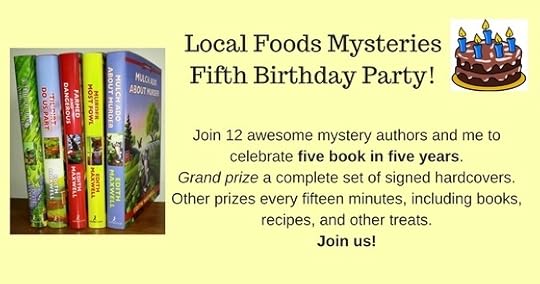
Readers: What’s your favorite quirky Memorial Day parade? How about the small farm where you like to buy produce? I’ll give away my last ARC of the book to one commenter.
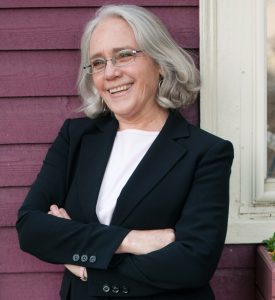 2017 double Agatha-nominated and national best-selling author Edith Maxwell writes the Local Foods Mysteries and the Quaker Midwife Mysteries; as Maddie Day she writes the Country Store Mysteries and the Cozy Capers Book Group Mysteries. Her award-winning short crime fiction has appeared in many juried anthologies and journals, and she serves as President of Sisters in Crime New England.
2017 double Agatha-nominated and national best-selling author Edith Maxwell writes the Local Foods Mysteries and the Quaker Midwife Mysteries; as Maddie Day she writes the Country Store Mysteries and the Cozy Capers Book Group Mysteries. Her award-winning short crime fiction has appeared in many juried anthologies and journals, and she serves as President of Sisters in Crime New England.
A fourth-generation Californian and former tech writer, farmer, and doula, Maxwell now writes, cooks, gardens (and wastes time as a Facebook addict) north of Boston with her beau and three cats. She blogs at WickedCozyAuthors.com, Killer Characters, and with the Midnight Ink authors. Find her on Facebook, twitter, Pinterest, Instagram, and at www.edithmaxwell.com.
Save
Save
Save
May 26, 2017
Weekend Update: May 27-28, 2017
 Next week at Maine Crime Writers, there will be posts by Barb Ross (Monday), Maureen Milliken (Tuesday), John Clark (Wednesday), Kaitlyn Dunnett/Kathy Lynn Emerson (Thursday), and Bruce Coffin (Friday).
Next week at Maine Crime Writers, there will be posts by Barb Ross (Monday), Maureen Milliken (Tuesday), John Clark (Wednesday), Kaitlyn Dunnett/Kathy Lynn Emerson (Thursday), and Bruce Coffin (Friday).
In the news department, here’s what’s happening with some of us who blog regularly at Maine Crime Writers:
Last Sunday, a group of us assembled at the Curtis Library for a Sisters in Crime event called Murder by the Minute. It was a fascinating look at what many writers are working on. Here are pictures of Brenda Buchanan and Maureen Milliken reading from their work.
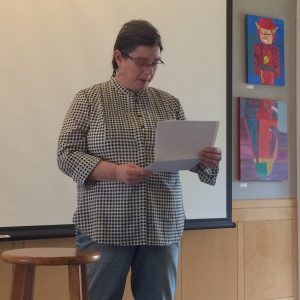
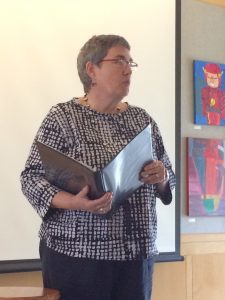
Lea Wait will be spending Friday, June 2, with students at the Madison Junior High School in Madison, Maine, talking about her book Wintering Well, and running writing workshops for the students.
All four e-books of Susan Vaughan‘s romantic suspense series, Devlin Security Force, are on sale until May 31 at most online retailers–On Deadly Ground, Ring of Truth, Cleopatra’s Necklace, and At Last. Readers can find buy links at her website.
from Kaitlyn Dunnett/Kathy Lynn Emerson: I’m still working on weeding out extra author copies of my books and will be doing more Goodreads giveaways over the next couple of months. Two will start next week and run for two weeks each. I’ll post links next weekend. One is for Scone Cold Dead, the second book in the Liss MacCrimmon series and the other is for one of my children’s books, Julia’s Mending, set in 1887 in rural New York state and aimed at young readers ages 8-12.
An invitation to readers of this blog: Do you have news relating to Maine, Crime, or Writing? We’d love to hear from you. Just comment below to share.
And a reminder: If your library, school, or organization is looking for a speaker, we are often available to talk about the writing process, research, where we get our ideas, and other mysteries of the business. Contact Kate Flora
May 25, 2017
When Life Gives You Lemons
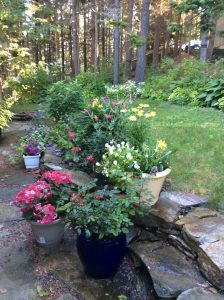
When the gardens don’t cooperate, I turn to self-watering pots. That way, when the writer gets wrapped up in Chapter 21, the plants survive
Kate Flora: We’ve all heard the old saying, “April showers bring May flowers,” but when April showers become endless May showers, most of the things people are saying are words we cannot print here. If you are in other parts of the country, away from the damp state of Maine, you may not relate to this. I am sure there have been a few good weather days–I think I recall one last week, but for the most part, it has been unseasonably cold and rainy this spring.
Normally, at this time of year, I am trying to figure out how to balance gardening, which I love, with writing, which I also love. At the beginning of the month, when it was gray but not raining, I blew off things like my thousand words a day schedule, to weed and mulch and divide and transplant and fill my planters with colorful annuals. I got much, but far from all, of the season’s prep done, because the work kept getting interrupted by rain. When it was raining, I followed the rule, “When life gives you lemons, make lemonade,” and allowed myself time to pore over plant catalogues and do internet searches, looking for shade-loving plants that the deer won’t eat.

View from the hall
For years, I have had a fabulous hosta bed which cares for itself, filling the shade with many shades of green, green and white, blue green, and yellow green. It held a variety of quilted leaves and broad leaves and narrow leaves, tall plants and medium plants and tiny plants, all topped with tall stems of purple and white flowers. It was lovely. The deer thought it was lovely, too. For the past few years, despite spraying or applications of red pepper and garlic, it has been a deer salad bar. They practically rang the door bell and asked for salt or salad dressing before wandering off to munch the patch into a field of stubble.
This year, I am fighting back. I am planting things the deer don’t like. Right now they are just wee little things, but in time, there will be a new garden that is NOT tasty.
But I am now way behind in the tasks that need to be done. A few days of getting soaked in the garden I can handle. Coming in muddy and scratched day after day? Not so much. And the rain has brought a bounty of mosquitoes and they have driven me back inside.

My father was a wizard at gardening, and he loved iris. I always found they died on me, but these seem to be surviving. And nothing seems to eat them!
We can agree, I think that rain is good for the flowers. What I am realizing is that it may also be good for writers. (More of this making lemonade business) When gardening is unpleasant, writing becomes that much more pleasant. Saved from the temptation to wander through the perennial bed, peering down to see if the “late bloomers” have emerged, I can rediscover the delight of figuring out how Alice is going to kill her husband, and then go research the effects of antifreeze. I can find the patience to sit at my desk, get back up to speed on the new Thea Kozak mystery. I think about the cast of characters I’ve created and wonder where Heidi has gone. Is her disappearance voluntary or has someone taken her? I can go back to subjecting Thea to the torture of trying to protect a school in trouble while worrying about her beloved father’s health.
Of course the weather will have another effect, too. In the book, it will be raining. My 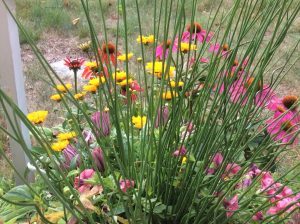
 characters will be sartorially and visually challenged, just as I am right now. And while the mosquitoes swarm hungrily outside the door, waiting to suck my blood, I can shed imaginary blood right here at my desk.
characters will be sartorially and visually challenged, just as I am right now. And while the mosquitoes swarm hungrily outside the door, waiting to suck my blood, I can shed imaginary blood right here at my desk.
Not mine, thank you very much. But I am quite sure, given this miserable weather, that someone in this book will bleed.

